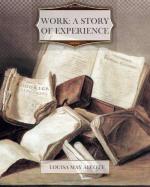“I knew your blessed husband; he was very good to me, and I’ve been thanking the Lord he had such a wife for his reward!”
Christie was thinking of all this as she sat alone that day, and asking herself if she should go on; for the ladies had been as grateful as the women; had begged her to come and speak again, saying they needed just such a mediator to bridge across the space that now divided them from those they wished to serve. She certainly seemed fitted to act as interpreter between the two classes; for, from the gentleman her father she had inherited the fine instincts, gracious manners, and unblemished name of an old and honorable race; from the farmer’s daughter, her mother, came the equally valuable dower of practical virtues, a sturdy love of independence, and great respect for the skill and courage that can win it.
Such women were much needed and are not always easy to find; for even in democratic America the hand that earns its daily bread must wear some talent, name, or honor as an ornament, before it is very cordially shaken by those that wear white gloves.
“Perhaps this is the task my life has been fitting me for,” she said. “A great and noble one which I should be proud to accept and help accomplish if I can. Others have finished the emancipation work and done it splendidly, even at the cost of all this blood and sorrow. I came too late to do any thing but give my husband and behold the glorious end. This new task seems to offer me the chance of being among the pioneers, to do the hard work, share the persecution, and help lay the foundation of a new emancipation whose happy success I may never see. Yet I had rather be remembered as those brave beginners are, though many of them missed the triumph, than as the late comers will be, who only beat the drums and wave the banners when the victory is won.”
Just then the gate creaked on its hinges, a step sounded in the porch, and little Ruth ran in to say in an audible whisper:
“It’s a lady, mamma, a very pretty lady: can you see her?”
“Yes, dear, ask her in.”
There was a rustle of sweeping silks through the narrow hall, a vision of a very lovely woman in the door-way, and two daintily gloved hands were extended as an eager voice asked: “Dearest Christie, don’t you remember Bella Carrol?”
Christie did remember, and had her in her arms directly, utterly regardless of the imminent destruction of a marvellous hat, or the bad effect of tears on violet ribbons. Presently they were sitting close together, talking with April faces, and telling their stories as women must when they meet after the lapse of years. A few letters had passed between them, but Bella had been abroad, and Christie too busy living her life to have much time to write about it.
“Your mother, Bella? how is she, and where?”
“Still with Augustine, and he you know is melancholy mad: very quiet, very patient, and very kind to every one but himself. His penances for the sins of his race would soon kill him if mother was not there to watch over him. And her penance is never to leave him.”




